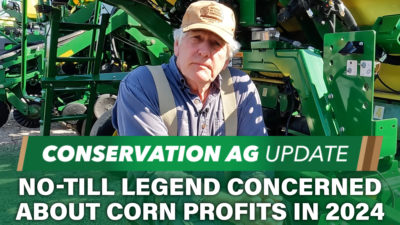Farmers in the African countries of Uganda, Algeria, Lesotho and Zambia have realized environmental and economic benefits of adopting no-till on their land.
George Kaweesi works for Rural Enterprise Development Services in Uganda. The organization trains, advises and guides small-acreage farmers in the adoption of better farm practices and alternative technologies, helping the farmers become more efficient and more productive.
By adopting no-till, Ugandan farmers have seen improved crop emergence, less crop stress, more soil water retention and improved soil structure. No-till also substantially reduces the amount of labor needed.
“No-till matters because it makes life easier and more profitable for the women and children who do much of the farming work,” Kaweesi says.
Within the first season of adopting no-till, yields increased by up to 100% with more efficient utilization of both on-farm and purchased inputs. Farm family nutrition also improved dramatically through the integration of high-protein legumes. Farm revenues have increased with the development of off-farm business opportunities and increased marketing of crops not needed for family consumption.
The economic impacts of no-tillage are especially significant for low-income countries. Benkhelifa Mohammed, who farms in Mostaganem, Algeria, was among the first farmers to use the results of a no-till research trial in Algeria’s semi-arid climate. Mohammed says no-till will revolutionize small-scale crop production in many poor countries that have limited water and little mechanization.
Approximately 80% of the residents of Lesotho, a small country completely surrounded by South Africa, depend on farming to survive. Yields declined by as much as 50% in the last few decades due to severely degraded soils, and as a result, the country had high unemployment rates in the mid-1990s.
During a Peace Corps tour, Terry Ellard of Seattle, Wash., became convinced that no-till farming was the only way to save the country’s soils. In 2011, Ellard started a project locally in Lesotho to manufacture farming tools other than plows. He returned to the U.S. after the tour ended in 2013 and began learning more about no-till to help design no-till appropriate tools that can be produced in African countries.
“No-till is the only way to save the severely degraded soils found in many of Africa’s smaller countries,” Ellard says. “Due in part to climate change, droughts are much more common. When rains come, they are often intense downpours and erosion can be a serious problem.”
No-till helps farmers in Zambia manage brush fires, also on the rise with climate change. Adrian Bignell, who farms in Zambia, says yield losses due to unexpected brush fires are among the biggest cropping concerns in central Africa. Even with firebreaks around his fields, a brush fire managed to jump the fireguard and burn a corner of a field.
Soybeans planted in the area showed some of the many benefits of no-tilling in managing harsh conditions. Bignell says the stunted soybean growth in the burned corner was clearly visible during one of the hottest and driest growing seasons on record in that region of Africa.
“At harvest, there was a 30 bushel per acre difference between the burned corner and the remainder of the field, with the unburned area yielding 48 bushels per acre,” Bignell says. “A loss in residue cover and less effective use of limited moisture clearly demonstrated the value of no-tilling in some of the driest areas of the world.”
Related Content
No-Till Key to Africa’s Agricultural Transformation: Agriculture is key to developing economies. In Africa, agriculture supports the livelihoods of 90% of the population and employs up to 70% of its workforce.
Zimbabwe Farmers Triple Crop Production with No-Till: More than 300,000 farmers in Zimbabwe are no-tilling and nearly tripling their crop production, leading to higher household incomes for farmers.
Helping Zambia Reach its ‘Huge’ Farming Potential: The opportunity for food exports and food security is a genuine reality in Zambia and Africa as a whole, no-tiller Bill Crabtree says, and it’s time for stakeholders to do something about it.
The No-Till Passport series is brought to you by Martin Industries.
Since 1991, Martin Industries has designed, manufactured and sold leading agriculture equipment across the U.S. and Canada. Known for Martin-Till planter attachments, the company has expanded to include a five-step planting system, closing wheel systems, twisted drag chains, fertilizer openers and more in their lineup. Their durable and reliable planter attachments are making it possible for more and more farmers to plant into higher levels of residue.









Post a comment
Report Abusive Comment